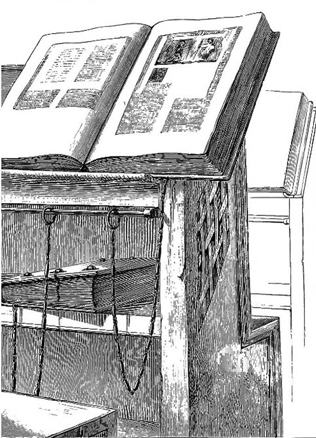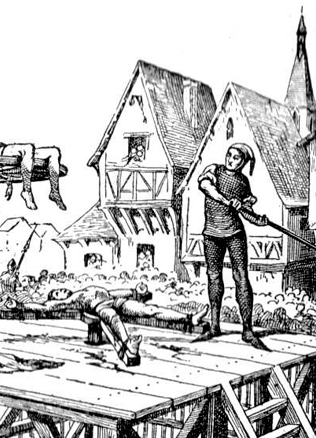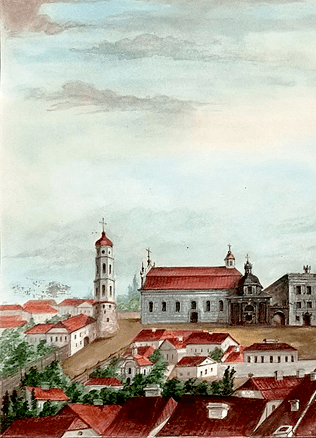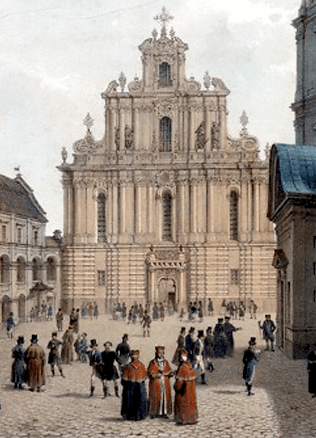How Theodor Latsky Won a Tournament in Rome
Genealogical journeys and digressions
The 1530s. In Muscovy, Grand Duke Vasili III Ivanovich dies in 1533. Power shifts from the Duma to the “Bearded Ones,” but they were not all likeminded.
Among them was a certain Ivan Vassilievich Latsky. He was a military leader and a diplomat, and a descendant of the well-known Zakharyin-Latsky noble family in Muscovy.
Dissatisfied with the way things were going, he started hatching a plan. In 1534, with war against the Grand Duchy of Lithuania looming, and finding himself in the borderlands, he defected to Lithuania, where he was received with respect and curiosity, since it was exceptional for someone of such a high rank to defect from Muscovy. Latsky nurtured great political ambitions, but they collapsed after the Starodub War (1534–1537), which did not bring any tangible results for the Lithuanians and prevented him from returning to his homeland. He lost all his property in Muscovy and had to begin a new life in Lithuania, which was no bed of roses for him. All the seats in the Council of Lords were occupied by mediocrities. In short, there was no room for him in the corridors of power. Just imagine what it was like for him, a third-generation Muscovite boyar, to have to give way over a slightest issue to someone like Jerzy Radziwiłł, with whom he was equal according to origins and rank. What a humiliation! What a blow to his self-esteem! In addition, he was an Orthodox believer, and in Vilnius the Catholics held power, and would not allow schismatics to sit on the Council of Lords.
Latsky defected to Lithuania along with his son Ivan, who had a son called Fyodor, born in 1554, and who was destined to play a role in Lithuanian history. Fyodor was born into a family which was unable to move upwards after 20 years in Lithuania, because the pinnacle of Ivan Latsky’s career was only the meaningless responsibilities of forest ranger Podlasie. Although it is true that there were plenty of opportunities to profit from it, because it included looking after the bison and timber of Belovezh Forest. Fyodor was the son of a Muscovite and a Ruthenian from the Grand Duchy of Lithuania. He was raised as an Orthodox believer, and at home he spoke a mixture of three languages (Russian, Ruthenian and maybe Polish). His father was a well-known soldier, who managed to raise more knights and foot soldiers for military campaigns than some members of the Council of Lords did. At home he kept an arsenal of guns, which he left in his will to his sons Fyodor and Grigory.
Adventures begin in Italy
Ivan Latsky died in 1569, when Fyodor was only 15. Fyodor experienced the first harsh blows of fate when he was still young. We have no reliable information about his life between 1569 and 1580. What is clear is that he converted from Orthodoxy to Catholicism in this period. With the change of faith came a change in the form of his name. Until his adolescence, he was called Fyodor. In later documents, he is known by the Catholic name of Theodor. In 1580, we meet this unremarkable and unknown noble in … Italy. What was he doing there? Theodor was accompanying the last of the Slutsk dukes Simeon Olelkovich on a journey around Western Europe. But he was travelling not as the ordinary escort of a simple minor duke, but as director itineris, the guide for the journey, as it was called in those times. The destination of Olelkovich’s journey was Italy, where he was intending to study at university. They visited Rome, Milan, Bologna and Lucca.
The guides of the children of the nobility on their journeys around Western Europe were usually experienced travellers, so there is no doubt that this was not Theodor Latsky’s first journey to Italy.
He enjoyed being in Italy very much. The years 1580 to 1586 were the “Italian period” of his life.
A miraculous story: unbelievable strength, and the hand of a princess
Latsky astounded the Italians with his physical strength, his skilful handling of arms, and his wrestling and fencing abilities. A truly great picture lays out before our eyes. The story has passed down from one generation to another about how in Venice, Theodor grabbed a bull by its horns and broke his neck. At the court of Stephan Bathory, he drew a bow that was a gift from the Tartar ambassador, which nobody else could fire. He pulled back the thick rope easily, fought off several attackers at the same time, and stopped flying four, five or six horse-drawn carts. What a man he was! The boy was no empty-head, either. He learned Italian and Latin and used words gallantly as they occurred to him. Having travelled to all the largest towns in northern Italy, he ended up in Novellara. In the late 16th-century, Novellara was a small town (even today it has less than 12,000 inhabitants) between Mantua, Reggio Emilia, Parma and Modena. Not only was it a town, it was also a whole private state. When our hero went there, it was ruled by the blackbearded Count Camillo II Gonzaga. What else can we say about Novellara? First there is the impressive 14th and 15th-century Gonzaga fortified palace, called Rocca Gonzaga, with its own theatre. There is also no shortage of churches and monasteries. The ruler’s wife Barbara Borromeo, the sister of Cardinal Charles Borromeo, had her own residence, called Casino di Sopra. The ruler’s palace was full of titled courtiers. The family of Count Pietro Bonarelli della Rovere, who had fallen on hard times, had also recently taken refuge there. The count had four sons (Guidobaldi and Prospero became famous 17th-century Italian poets), and three daughters, of whom the oldest was Isabella. She caught the eye of our Theodor, and while exactly how it all transpired remains unknown, they were engaged in Novella in the autumn of 1582, and the wedding took place at the end of 1584 or in early 1585.
Who was the mystery knight who wiped out his opponents?
From Italy, Theodor went to Malta. The Order of Malta was based there at the time, protecting Catholic Europe from attacks by the Turks and Theodor Latsky served for some time in a military unit of this order.
Our hero’s popularity in Italy was crowned by the events of 16 February 1586. The place of the action was a square in Rome. The Roman crowd was impatiently waiting for the start of a knightly tournament. At the beginning, the spectators watched an erotic male act: races between naked men were held, first young, then old, and finally boys. After that, the trumpets sounded, and in rode the long-awaited participants in the tournament, some knights and a few dukes. They were wearing masks. The horses and their arms glittered with gold. In their hands they held spears, which would decide the winner. The rules were simple: in the distance stood a quintana, with a wooden dummy mounted on it dressed in a Saracen’s clothes. On its chest was a shield, which had to be hit with a spear. The rotating dummy had an outstretched hand, to which a hammer was mounted, which was capable of turning a careless rider out of his saddle. Racing in pairs, the one who hit the dummy’s shield properly with his spear, turning the wheel, and crossed the finishing line first, was the winner. What were the prizes? Money and jewels! When the tournament began, our hero stood alongside his first opponent. The crowd watched to see who would win. And it was Latsky who won all the winner’s laurels, wiping all the other competitors, one after the other, out of the competition.
The Romans asked each other only one question: “Chi è?’ Who is he? Someone said: Forestiero. A foreigner.” It is clear that we are talking here about the predecessor of our Olympic champions.
Darius Antanavičius



